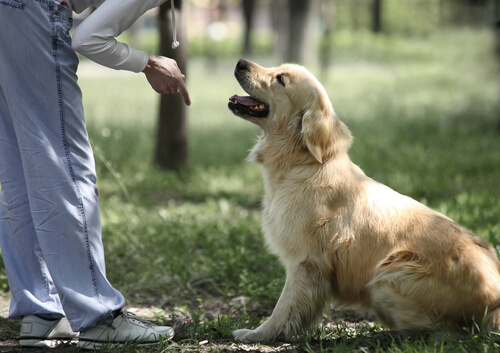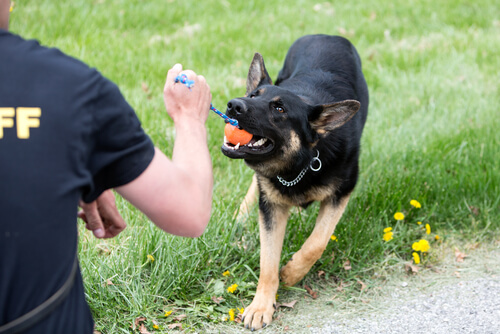Dog Training: How to Motivate Your Dog

Teaching your dog to be obedient, how to follow a command, or to behave in a certain way can be a long and arduous task. This is especially true if your dog isn’t really one for hard work. However, there are ways you can motivate your dog and help it learn more quickly.
Whether it be at a professional training class or at home, your dog has to want to learn. This doesn’t always come naturally for our four-legged friends, which is why finding some way to motivate your dog is essential.
How to motivate your dog

Every dog is interested and motivated by different things. It’s important to know what will capture your dog’s attention, so you can use it as a way to achieve specific goals.
Motivating your dog requires two things. The dog’s own internal motivation, and the motivation that comes from the external goal. Their inner motivation pushes them forward, while the exterior urges them on.
Balance: an essential part of dog training
The goal needs to be more interesting to your dog than any of the other things that surround it. However, it’s important to balance your dog’s internal motivation with the external goal.
If your dog has strong self-motivation, the external goal doesn’t need to be as strong. Maintaining both at high levels can make learning difficult. Balance is the key.
How to motivate your dog: positive reinforcement
When it comes to teaching him to follow commands, there is nothing better than using things your dog likes to attract his attention. For example, if you want your animal to come, he’ll find it easier to obey if you offer him something he wants in return, like a treat, for example.
This teaching method has been proven to give the best results over the years.
Ability, attitude and instinct
Ability is your dog’s innate skills, and the talent they have for specific tasks. Their attitude is what allows them to hone these abilities. Instinct is linked to motivation. There are several different types of instinct:
- Hunting
- Food
- Pack
- Defense
- Play
These instincts are “pre-programmed” into every dog, and you can use them to help motivate them. For example, if you want to teach your animal to fetch, you can play on their hunting instinct.
Frustration and stress

Like humans, animals can get frustrated when they don’t get what they want. They can also feel stressed when they try to achieve something and fail. To avoid this, you need to set manageable goals for them to achieve, so they gradually get better and better over time.
To do this, you need to vary the tasks and tests you give them, understanding your dog’s capabilities and tailoring the challenges accordingly.
Spoiling or overprotecting your dog can make it overly dependent on you, and even cause behavioral issues. From a young age, you need to establish rules and routines. Training and learning are an essential part of this.
That way, your pet will know that it will always have your love and affection, but that you will expect more of it every day. Let them know you love them, and that you trust in the fact that it can achieve the goals you set.
The most stressful situations for any animal are those in which it has no control, and those in which it can’t predict what’s going to happen.
The importance of knowing your dog
It’s important to know your dog’s skills and abilities, and what will motivate it to learn. For example, pastoral breeds such as collies will probably find games such as fetch too easy. However, it all depends on what your dog is like as an individual.
If you follow these tips and advice, then finding a way to motivate your dog should be easy. But remember, you’ll also need plenty of patience, perseverance and love.
Teaching your dog to be obedient, how to follow a command, or to behave in a certain way can be a long and arduous task. This is especially true if your dog isn’t really one for hard work. However, there are ways you can motivate your dog and help it learn more quickly.
Whether it be at a professional training class or at home, your dog has to want to learn. This doesn’t always come naturally for our four-legged friends, which is why finding some way to motivate your dog is essential.
How to motivate your dog

Every dog is interested and motivated by different things. It’s important to know what will capture your dog’s attention, so you can use it as a way to achieve specific goals.
Motivating your dog requires two things. The dog’s own internal motivation, and the motivation that comes from the external goal. Their inner motivation pushes them forward, while the exterior urges them on.
Balance: an essential part of dog training
The goal needs to be more interesting to your dog than any of the other things that surround it. However, it’s important to balance your dog’s internal motivation with the external goal.
If your dog has strong self-motivation, the external goal doesn’t need to be as strong. Maintaining both at high levels can make learning difficult. Balance is the key.
How to motivate your dog: positive reinforcement
When it comes to teaching him to follow commands, there is nothing better than using things your dog likes to attract his attention. For example, if you want your animal to come, he’ll find it easier to obey if you offer him something he wants in return, like a treat, for example.
This teaching method has been proven to give the best results over the years.
Ability, attitude and instinct
Ability is your dog’s innate skills, and the talent they have for specific tasks. Their attitude is what allows them to hone these abilities. Instinct is linked to motivation. There are several different types of instinct:
- Hunting
- Food
- Pack
- Defense
- Play
These instincts are “pre-programmed” into every dog, and you can use them to help motivate them. For example, if you want to teach your animal to fetch, you can play on their hunting instinct.
Frustration and stress

Like humans, animals can get frustrated when they don’t get what they want. They can also feel stressed when they try to achieve something and fail. To avoid this, you need to set manageable goals for them to achieve, so they gradually get better and better over time.
To do this, you need to vary the tasks and tests you give them, understanding your dog’s capabilities and tailoring the challenges accordingly.
Spoiling or overprotecting your dog can make it overly dependent on you, and even cause behavioral issues. From a young age, you need to establish rules and routines. Training and learning are an essential part of this.
That way, your pet will know that it will always have your love and affection, but that you will expect more of it every day. Let them know you love them, and that you trust in the fact that it can achieve the goals you set.
The most stressful situations for any animal are those in which it has no control, and those in which it can’t predict what’s going to happen.
The importance of knowing your dog
It’s important to know your dog’s skills and abilities, and what will motivate it to learn. For example, pastoral breeds such as collies will probably find games such as fetch too easy. However, it all depends on what your dog is like as an individual.
If you follow these tips and advice, then finding a way to motivate your dog should be easy. But remember, you’ll also need plenty of patience, perseverance and love.
This text is provided for informational purposes only and does not replace consultation with a professional. If in doubt, consult your specialist.








